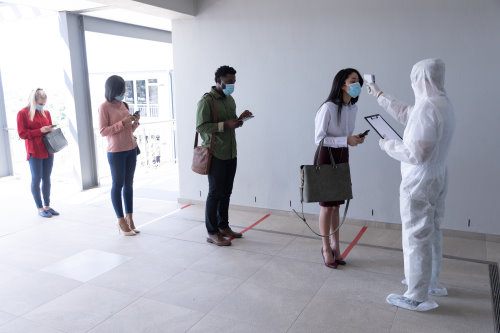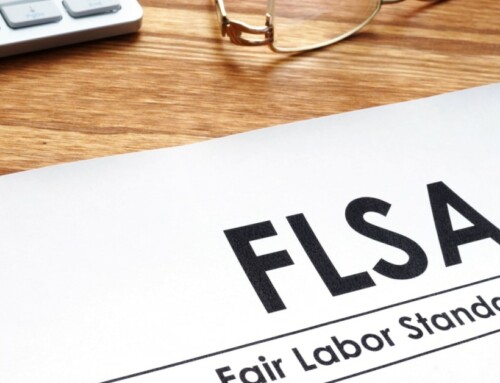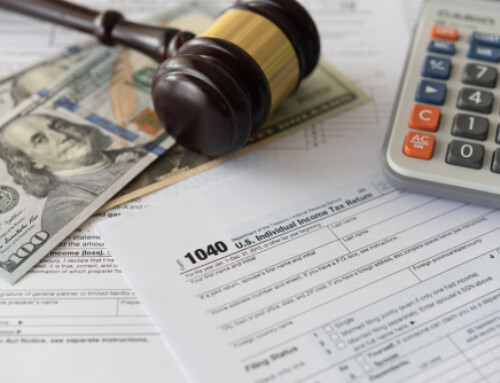As we enter 2021 with multiple COVID-19 vaccines in the first stages of deployment in the United States, there is a reason for optimism in the New Year. But government officials and health experts have also made clear that there is a long road ahead, and individuals and businesses must remain vigilant to help prevent the spread of COVID-19.
For employers in South Carolina, what does this mean as we head into 2021? What do employers need to do? What can employers do to mandate employee compliance, and what are the legal risks involved with failing to take adequate measures in response to the ongoing pandemic?
Establishing and Maintaining Workplace Safety During the COVID-19 Pandemic
In June 2020, we published an article titled, What Factors Should Carolina Employers Consider as They Reopen from COVID-19? We discussed some of the key legal considerations involved with operating a business during the pandemic. While we provided this guidance shortly after South Carolina’s stay-at-home order expired, much of it remains relevant heading into 2021.
For example, one of the issues we touched on in June was screening employees for COVID-19. As we wrote then, employers can (and in many cases should) screen their employees for COVID-19, provided that they do so in accordance with legally-compliant policies and procedures. We also noted that employers should carefully consider their employment needs (which remains true today). We advised that companies that are able to do so should consider allowing their employees to work remotely to reduce the risk of COVID-19 exposure in the workplace.
Addressing Employment Litigation Risks Related to COVID-19
In July 2020, we published an article titled, Resolving Employment Disputes During the COVID-19 Crisis: 5 Tips for South Carolina Employers. It also provides some important insights that South Carolina employers can take with them into 2021. The COVID-19 pandemic presents many risks for employers in the area of employment litigation, from tort claims involving COVID-19 exposure to allegations of discrimination related to who gets tested and who gets to work from home.
When faced with the risk of employment litigation, companies must promptly assess the merits of the employee’s (or employees’) allegations and develop an informed and cohesive defense strategy. Are the allegations cause for concern? Is it likely that educating the employee (or employees) involved will be sufficient to clarify why the company’s practices are both sufficient and compliant? Here, too, having documented policies and procedures is critical, as companies must be able to respond quickly while also demonstrating that they have followed a systematic approach focused on investigating the allegations in good faith while also protecting the company’s best interests.
Requiring Employees to Get the COVID-19 Vaccine
A question that many South Carolina employers are likely to have in 2021 is, “Can I require my employees to get the COVID-19 vaccine?” An alternative question may be, “What are the legal risks if my company does not require COVID-19 vaccination?”
Although many people will consider getting vaccinated to be very different from wearing a mask or practicing social distancing, the same basic principles generally apply to all types of workplace safety measures from an employment law perspective. In other words, to the extent that companies can require their employees to wear masks or practice social distancing, they can also require their employees to get vaccinated against COVID-19.
However, as we discussed in June, there are some limitations. There are some important considerations that employers will need to keep in mind if and when they adopt policies that require their employees to demonstrate that they have received the COVID-19 vaccine before they are able to return to work. For example:
- Discrimination Concerns Related to Mandatory COVID-19 Vaccination – It will not be safe for everyone to get the COVID-19 vaccine, and some employees’ religious beliefs will prevent them from getting vaccinated. If an employee has a health condition that makes vaccination unsafe, if an employee’s religious beliefs prevent vaccination, or if an employee chooses not to get vaccinated for any other legally-protected reason, the employer must be very careful to avoid taking adverse employment action that could be deemed discriminatory.
- The Feasibility of Providing Reasonable Accommodations for Employees Who Do Not Get Vaccinated – For employees who do not get vaccinated, employers may also be required to assess the feasibility of providing “reasonable accommodations” under the Americans with Disabilities Act (ADA) or Title VII of the Civil Rights Act of 1964.
As the Equal Employment Opportunity Commission (EEOC) explains in its publication, Pandemic Preparedness in the Workplace and the Americans with Disabilities Act:
“An employee may be entitled to an exemption from a mandatory vaccination requirement based on an ADA disability . . . . This would be a reasonable accommodation barring undue hardship (significant difficulty or expense). Similarly, under Title VII of the Civil Rights Act of 1964, once an employer receives notice that an employee’s sincerely held religious belief, practice, or observance prevents him from taking [a] vaccine, the employer must provide a reasonable accommodation unless it would pose an undue hardship as defined by Title VII (‘more than de minimis cost’ to the operation of the employer’s business, which is a lower standard than under the ADA).”
Depending upon the specific circumstances at hand, a reasonable accommodation for an employee who is unable or unwilling to get the COVID-19 vaccine could mean allowing the employee to work from home or potentially require a mask (or other safety precautions) in lieu of vaccination. This will be a novel area of compliance and risk mitigation for employers in 2021, and companies will need to make informed decisions based on the advice of their employment law counsel.
Regarding the legal risk associated with not requiring employees to get vaccinated, the answer here also depends on the specific circumstances at hand. While employers have an obligation to provide a workplace reasonably free of health and safety hazards, what this means once the COVID-19 vaccine becomes widely available is an issue that employers will need to address on a case-by-case basis.
Speak with a South Carolina Employment Lawyer at Gignilliat, Savitz & Bettis, LLP
Located in Columbia, SC, employment lawyers at Gignilliat, Savitz & Bettis, LLP serves as employment law counsel for employers throughout South Carolina. If you have questions about what your company can (and should) be doing in response to the COVID-19 pandemic, we encourage you to call 803-799-9311 or contact us online to arrange a confidential consultation.






